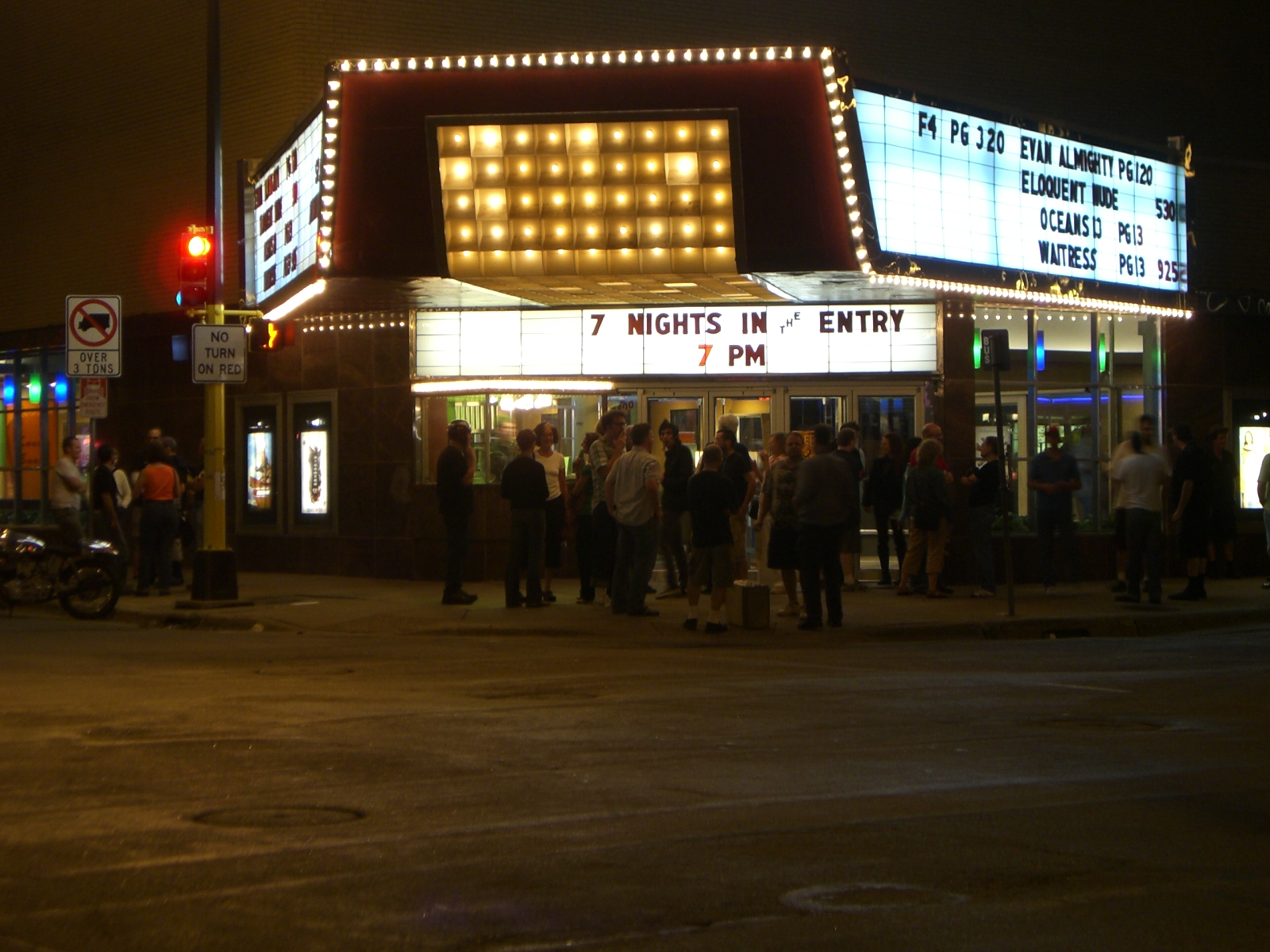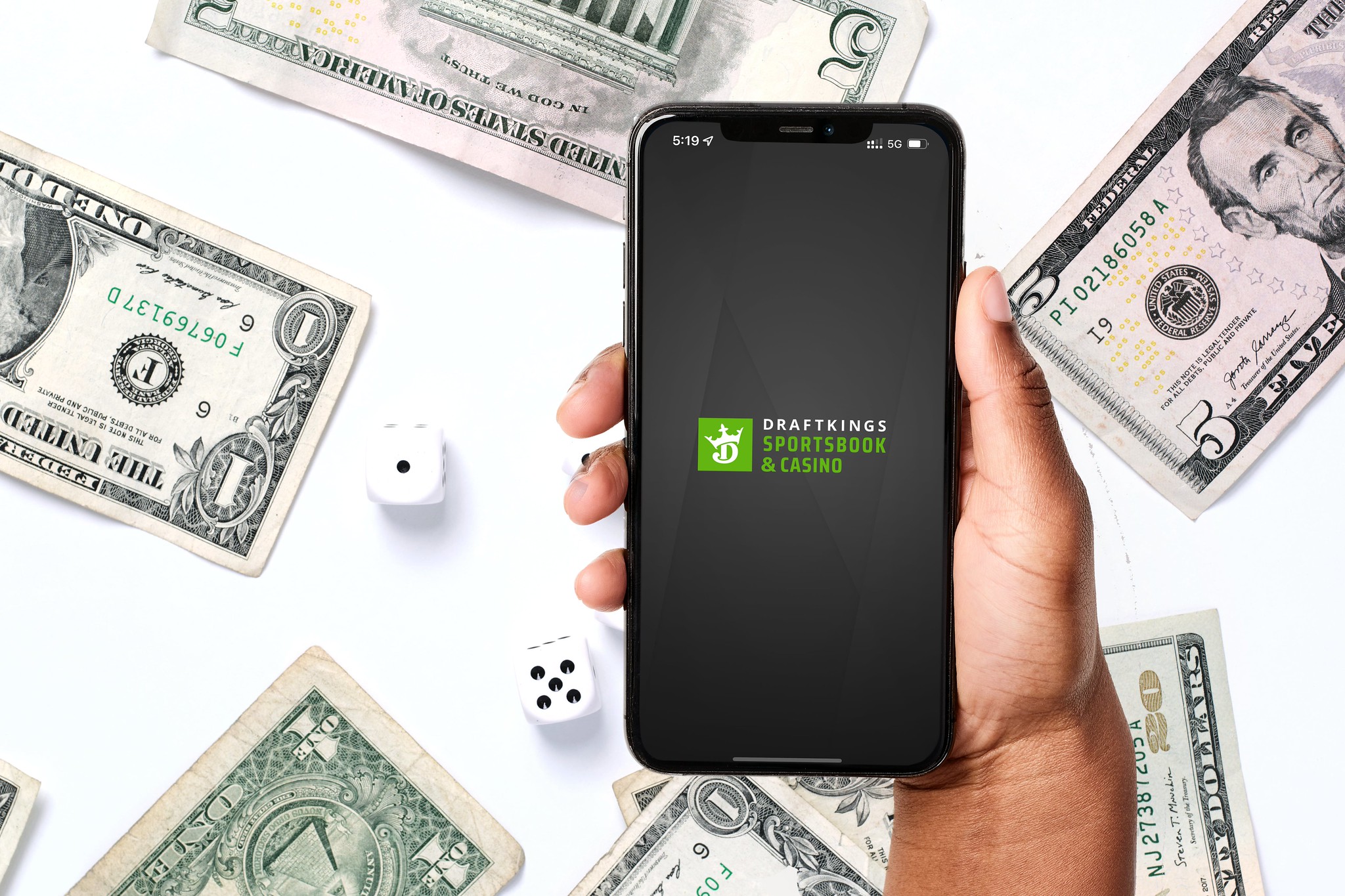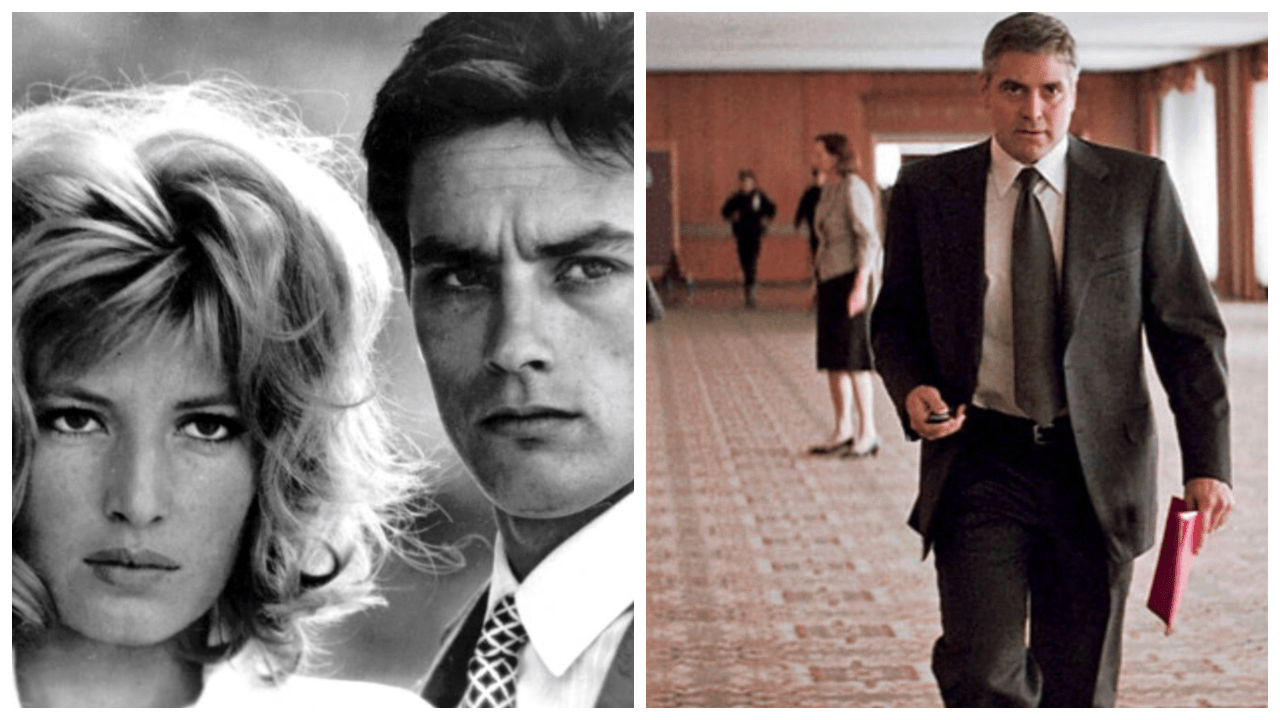A festival dedicated to films about music—it sounds like a perfect pairing of form and subject, and an excuse to watch a bunch of fun movies too. Yet until 2000 no one had really made a go of it. Lucky for us, they did it right here in Minnesota.
This year, Sound Unseen celebrates its 25th year, and its last before pausing indefinitely. (Don’t worry: There will still be monthly Sound Unseen screenings at the Trylon.) To honor the occasion, I rounded up all four of the festival’s directors, as well as a few of the fest’s programmers and assorted well-wishers, and asked them how they kept it going so long.
The participants were often a little fuzzy about their memories, especially when it came to exact dates. But they all remember the excitement, anxiety, and exhaustion of putting a festival together and somehow keeping it alive for a quarter-century.
HOW IT ALL STARTED
Adam Sekuler, former festival programmer: In 1999, if you found yourself lingering around the U Film Society office, you'd hear the familiar hum of Al Milgrom tirelessly working on the Minnesota-St. Paul International Film Festival. Meanwhile, Nate Johnson, the society’s communications director, was laying the groundwork for what would become one of Minneapolis's most enduring film festivals.
Nate Johnson, founder, festival director 2000-2002: My first real job out of college (after a brief stint behind the counter at the Electric Fetus with Slug and Jon-Jon Scott) was as the Director of Publicity for the U Film Society. I quickly learned the indie film exhibition business from Al Milgrom, the 70-something-year-old absolute wild man who ran the show.
I was also running a small record label side project with friends called Fighting Electric Records, so I decided to combine those two interests in a festival of films about music, which was unique—I didn’t know of any other festivals with that narrow focus.
Richard Hansen, festival director 2008-2011: I didn’t contribute much in the beginning, but Nate and I did share a studio in an old grain silo thingy, so I was always around it.
Nate was the hardest-working guy I ever met. He’d be at the studio for days at a time. The place did have a shower, but I’m sure we were not supposed to be sleeping there. 9/11 happened when we were there. That was a thing. Gretchen Williams was around a lot then, too.
Johnson: Gretchen threw an opening night party at some warehouse space and everyone was there. I had no idea how to throw a party. It was glorious.
Gretchen Williams, festival director, 2003-2007: I was freelancing for film nonprofits in Minneapolis and had just produced 2000 Years of MN Music Videos for IFP North at the Suburban World Theater. When Nate asked them for assistance and recommendations, they suggested me.
Johnson: The third year of the festival, 2002, sold out both opening night films at the now-defunct Oak Street Cinema, and sold out numerous other films throughout the week. It had momentum and buzz. I had friends and collaborators putting a lot of energy into it. It was fun to experience a vision unfold and succeed.
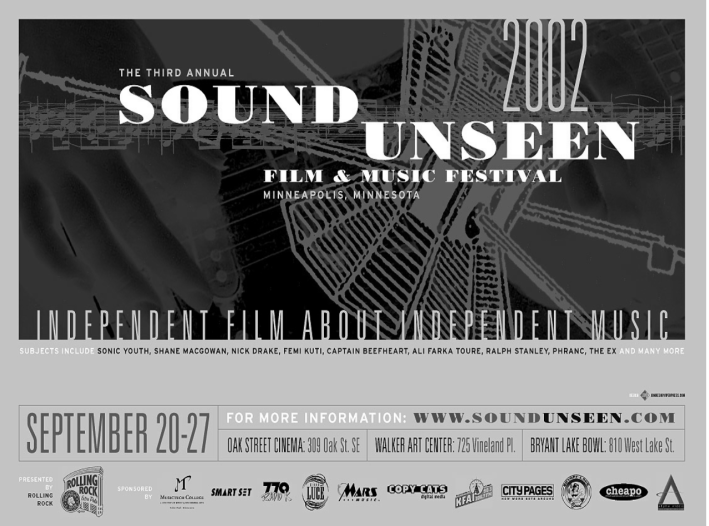
KEEPING IT GOING
Williams: Nate and I got along well and when he chose to step away and chase his dreams of living off grid and supporting himself in nature he offered the festival to me, graciously.
Johnson: I gave away all my belongings and decided to go work on organic vegetable farms and learn how to build houses and do practical things.
Williams: I was the festival director but I hired program directors to curate—Peter Lucas, Emily Condon, Adam Sekuler all contributed.
Emily Condon, former festival programmer: There were a few solid years there where it really felt like a community, where people really were making music and films and parties and events and some pretty great things came out of it. Tapes ‘n Tapes’ first-ever gig was when Gretchen booked them for a Sound Unseen event. They made their first video for a Sound Unseen DVD, they shot the footage at MOA in some photobooth.
And… a few less than great things too, when it came to all the drinking and such and what that occasionally wrought.
Melissa Maerz, former City Pages arts editor: Gretchen had a party (she called it a BOOYA party and we were often yelling “BOOYA!” throughout the night) in the parking lot outside her apartment to raise money for Sound Unseen. Her friend Kelly Mahoney designed the kissing booth, which was beautiful, and a bunch of us signed up to be the kissers.
We even had a menu where we made up “styles” of kissing that had dollar amounts next to them. They had names, like the kind of ridiculous names you’d give to cocktails or nail polish colors, but we just kind of made up what style of kiss went with each band. I remember kissing a ton of people that night—including some good friends, which must have been awkward?—and all of us waking up with very sore throats in the days afterward.
I also remember at that same party was the first time I drank alcohol from a garbage can.
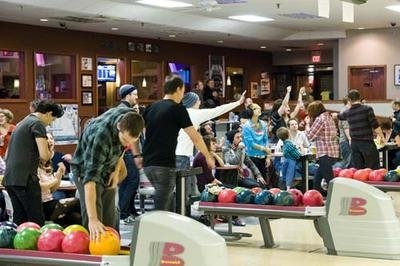
Williams: We also hosted a really fun event a couple years in a row at the Bryant Lake Bowl, called Rock ‘n’ Bowl. Local bands played against fans. One year, Mark Fox of Fox Tax had a team of fans all dressed in tennis uniforms which was pretty fun at the time.
Rex Sorgatz, founder of defunct local message board MNSpeak: If no one has made the comparison yet, it needs to be said: Gretchen was our Chloë Sevigny.
Hansen: In what was one of my favorite moments, at the end of the 2006 festival, Atmosphere was performing a surprise pop-up show for the fest at 7th St. Gretchen asked if I wanted to take over the festival right before that show, and I was so stunned that she asked me. I felt like the coolest person because the coolest person I knew just asked me to helm the coolest festival in the state. It was cool.
Sekuler: Rick Hansen, Steve Holmgren, Jim Brunzell, and I brought the festival to Duluth, launching what we called Sound Unseen Duluth. Rick met his future wife there, eventually moved to Duluth, and founded the now 15-year-old Duluth Superior Film Festival.
Hansen: The goal was to operate in both locations, but it became very clear that that was not going to work. Jim Brunzell approved the organizational split. He took the Twin Cities fest and I kept going in Duluth.
Rich Gill, current program director: The best thing about doing this with Jim is that he's never acted like it's "his" festival and we all just work for him. It's always felt like a team effort in the best sense of the word. He's always fostered the idea that this is our thing and no one is more important than anyone else.
CRISES AND CHALLENGES
Hansen: We were never not in crisis.
Johnson: Running a festival is a series of connected crises that begin a month before the opening date and end at 3 a.m. at the closing party.
Hansen: The truth is every part of all festivals, but particularly Sound Unseen for me during those years, is that it is nothing but a high wire act. We never had enough money, staff was stretched beyond thin, everyone always needed questions answered faster that we could give them. I stuck my sister in the box office against her will too many times to be forgiven. We were all just trying to hang on to the tiger’s tail.
Williams: Every year it was a challenge to get people in seats at the theater. At the time, it felt like mainstream theaters were struggling to do the same.
Hansen: We never canceled a single show, though. The show always went on.
Johnson: Funding is always a crazy mess. I also had to learn how to work with the big venues in town, and I was pretty naive about that. The festival collaborated with First Avenue on events as well as the Walker Art Center, so I had to find a way to channel my DIY energy and merge it with established organizations. At one point I remember [former DJ at the Current] Mark Wheat stepping in to moderate a conflict resolution meeting with First Avenue—kudos to [First Ave staffers] Nathan Kranz and Sonja Grover for having patience with me!
Jim Brunzell, festival director 2012-present: Costs have only gone up across the board from flights, screening fees, marketing and advertising, hotel rooms. But there was one year (not this year—and I won't say what year) that we spent around $1,200 on the entire festival and we had some awesome guests fly in because they wanted to be part of the festival and we got all the hotel rooms donated.
Williams: In 2003 we featured [the hip-hop band] Hop Fu as our opening night show. Brooklyn-based DJs IXL and Spae provided a live hip-hop score to the 1982 film Superninjas. The sound company that sponsored us was unfortunately way out of their league with the intricate and complex setup that was required for this event, and people stood outside on a blustery day for probably 90 extra minutes while we scrambled to pull it together. Thank goodness it finally did.
Condon: Gretchen remembers it as Hop Fu, I remember it as Tron, and someone was doing some kind of live electronic score. I wasn't working for SU yet, but was working for the Oak Street, and we were a venue for SU. They were having technical difficulties. We had a sold-out crowd outside Oak Street.
Williams: Emily would recall details better than I.
Condon: I'm almost positive it was Tron.
Williams: I'm in perimenopause, and the brain fog is real.
Condon: I walked the line of 300 people for around an hour, just continuing to tell them that we were trying to get the show going as soon as possible. We wound up going on around an hour late, at least. I was sweating bullets the whole time.
After the show finally got started, I brought Gretchen and Peter Lucas upstairs to Bob Cowgill's office and reamed them out. I was just so angry and told them so in very clear terms. Told them and then told them again. And again. It was the first extended conversation I ever had with Gretchen. Some time after that we developed a very nice friendship and remain friends to this day.
Brunzell: Having Opening Night the day after the 2016 election, that was a major disaster.
When writer/director Richard Kelly attended with both Donnie Darko and Southland Tales in 2016, he called me at around 7 a.m., to tell me he didn't want to get on the plane because of the 2016 election results. After we chatted for about half an hour, he did finally get on the plane, and he had never been to Minnesota, and he loved it.
Williams: It was hard to incorporate consistent self-care when you were juggling all the things that you're responsible for when you produce a festival, and the constant worry and overthinking that came with it.
Brunzell: Covering films and festivals in the Twin Cities is less of a priority these days as it was compared to when I started at Sound Unseen in 2008. I think many art festivals, not just film, but other art festivals really struggle for local coverage.
VICTORIES, HIGH POINTS, AND FAVORITE FILMS
Brunzell: Being named one of the 25 Coolest Film Festivals in the World by Moviemaker Magazine in 2016 and 2019 is certainly a proud moment. Then there was the time I was talking to a complete stranger in Berlin in 2019 who recognized my Sound Unseen shirt on the street saying how much he loved our festival and wished the festival could happen there.
Johnson: In 2002 I took the festival on tour across the Midwest—my friend Steve Timble in Chicago had connections with Rolling Rock beer, so we walked into the board room with their head advertising execs and convinced them to give us $56K to travel with the festival. It was a hilarious meeting. But then we had to do an incredible amount of work.
Williams: We also shared some films with the Popcorn Festival in Stockholm, Sweden. I met up with Miako Ushio, who used to book the Dinkytowner back in the day and had a great time despite literally every person we met asking us how we could allow George W. Bush to win a second term. Boy, would it be hard to explain ourselves today if we were there again.
Also, Stockholm was really expensive, like overpriced strip club prices, so we snuck sandwiches and bottles of wine whenever and wherever we could from the staff lounge.
Brunzell: There are so many high points for me. Anvil! The Story of Anvil was our closing night film in 2008 and they struck a new 35mm print for our screening. Selling out our closing night film, Being BeBe at the Walker Art Center in 2021 following our first back in person festival after the pandemic. Chop & Steele in 2022 might have been the best audience and screening experience I've ever witnessed; All the Beauty & the Bloodshed is one of my favorite films in the 21st century.
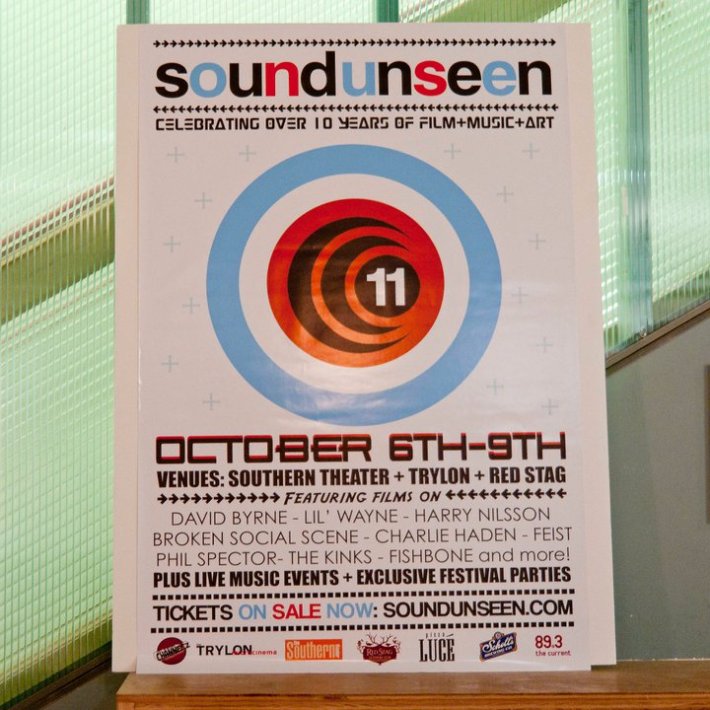
Williams: My favorite film was Rick Fuller's Minneapolis music film HeyDay, we screened it to a giddy audience at the Riverview Theater in 2006, which was such a treat to see a theater packed with musicians, some in the film, and die hard fans who can never get enough of the Minneapolis music scene. I felt lucky to be a part of that.
Hansen: I’m pretty sure my proudest moment came during the screening of Who Is Harry Nilsson and Why Is Everyone Talkin’ About Him? We were at the Southern Theater working with the great Kate Nordstrum [founder of the St. Paul Chamber Orchestra’s Liquid Music series] who helped us get [the Jayhawks’] Gary Louris and [the Suburbs’] Chan Poling to perform Nilsson songs after the screening.
I was sitting in the dressing room stressing out about all of it when Chan came in and we had a serendipitous chat. He really took a moment to reassure me and just let me know of the value of what we were doing around all of it. It meant a lot to me. I’m sure he would not remember, but I sure will forever. I never really told anyone about that moment until now.
Later that year, some artists and curators were asked to share the highlights of the year from their perspective for City Pages and Kate offered up that bit of collaborative programming as her personal highlight. It makes me tear up just thinking that we had that kind of impact on someone so great and that she took the time to acknowledge it in the press for everyone to read.
Gill: I look at Sound Unseen as the Mitch Hedberg or the Replacements of film festivals. We're definitely not the biggest or most well known and we may not be your favorite festival, but we’re your favorite band’s or favorite director’s favorite festival. We're the scrappy DIY indie-rock band of film festivals.
LIFE AFTER SOUND UNSEEN
Johnson: I worked on various farms, started my own farm, worked carpentry and masonry, built log homes and fireplaces, and then got lost in the wilderness for about 15 years making things by hand and living off the land. I currently teach handcraft classes and wilderness skills and make knives and various tools to sell.
Williams: I like ending things on a high note, leaving the party while you still look fresh, and the 2006 festival felt like that. I knew that it was time to move on when I just felt uninspired to continue. I was lacking inspiration and wanted to join my friends in NYC to see what I could make happen there.
I’m about to finish grad school in May with a masters in clinical mental health counseling. I'm currently in my clinical internship seeing clients at Collaborative Trauma Solutions about 90 minutes away from Telluride. Teaching yoga for 10 years, holding space for massage clients and my own therapy journey have set me up well for the work I'm doing now. It's the first job I don't mind working long hours at.
Condon: I probably got my job at This American Life because of Sound Unseen. I programmed a short doc that This American Life’s production manager at the time, Seth Lind, made about Bernie Worrell in Sound Unseen. A couple years later, he saw Sound Unseen on my resume and remembered dealing with me on that. Definitely helped get me in the door. There were like 1,200 applicants, and I got it.
Hansen: At the moment I am connected to the West Theatre in Duluth (and the soon-to-open, West Theatre-adjacent Alhambra Theatre) helping Duluth media impresario Bob Boone, trying my hand at development and membership and selling popcorn.
Johnson: I know pretty much nothing about the current state of music and film, but I’m glad the festival is still going!
Brunzell: I do deeply care about the festival, but I also don't want to be running it until I'm 85 or 90 like Al Milgrom. We'll see how this year's festivals go and we'll regroup after them, then take a long-deserved break from the festival in 2025 and see if the band wants to get back together in 2026 or 2027 to do another festival.
It’s like how each year, we had to wait on Larry David to see if he wanted to do another season of Curb Your Enthusiasm or not. Only time will tell.
Sound Unseen runs from Thursday, November 14, through Sunday, November 17, at various venues. Find full schedule and other details here.
